JAVA process control is implemented in this way

##Process control
JAVA input and output
Input
Two input methods:
Method 1: java.util.ScannerThe code is as follows:
public class a { public static void main(String[] args) { var sc = new Scanner(System.in); System.out.println("请输入姓名:"); String name = sc.nextLine(); System.out.printf("%n欢迎你:%s", name); }}Copy after login
Generate a Scanner object, output "Please enter your name:", return the input string and assign it to name, and output "%nWelcome %s" where %n represents a newline and %s represents nameResult:
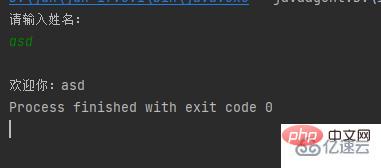
Method 2: JOptionPane If the input content is confirmed, the string value will be nullResult:public class a { public static void main(String[] args) { String w = JOptionPane.showInputDialog("请输入词汇:"); System.out.println(w); }}Copy after login
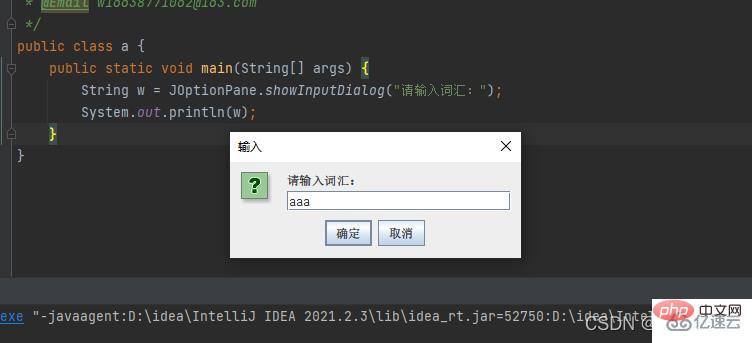

Three ways to output on the consoleMethod 1: System.out.print (); Output to the console
Method 2: System.out.println(); Output to the console and wrap
Method 3: System.out.printf(); Format the output to the console
Code demonstration:
The first method outputs directly without line breaksResult:public class a { public static void main(String[] args) { int w = 1; int a = 2; System.out.print(w); System.out.print(a); }}Copy after login

The second line feed outputResult:public class a { public static void main(String[] args) { int w = 1; int a = 2; System.out.println(w); System.out.println(a); }}Copy after login
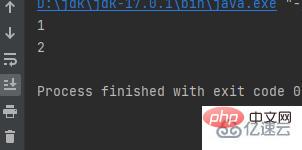
The third formatted outputResult:The meaning of %d It is an int type variable, that is, replace the first %d with the value of w, and replace the second %d with the value of a
public class a { public static void main(String[] args) { int w = 1; int a = 2; System.out.printf("w=%d a=%d", w, a); }}Copy after login

Branch statement
if else
if() The condition in the brackets returns true as long as it is correct, and false if it is wrong.else means otherwise
public class a { public static void main(String[] args) { if (1>2){ System.out.println("A"); }else { System.out.println("B"); } }}Copy after login
Multiple judgments are as follows: If the first judgment is incorrect, the next judgment will be made. When the return value is true, it will be executed, otherwise else## will be executed.switch case default#
public class a { public static void main(String[] args) { if (1 > 2) { System.out.println("A"); } else if (1 > 0) { System.out.println("B"); } else { System.out.println("C"); } }}Copy after login
#switch multi-branch switch statement
switch(w) w in brackets is the judgment parameter, and the number after case is A value that matches w. When the value of w matches the value after the case, the statement in the current case is executedbreak means to exit the current judgment, which means that there is no need to judge again later
default means the default value, when there is no match The default is thisresult:public class a { public static void main(String[] args) { int w=1; String wk = ""; switch (w) { case 2: wk = "星期一"; break; case 3: wk = "星期二"; break; case 4: wk = "星期三"; break; case 5: wk = "星期四"; break; case 6: wk = "星期五"; break; case 7: wk = "星期六"; break; default: wk = "星期日"; break; } System.out.println(wk); }}Copy after login
 Loop statement
Loop statement
for
for ( int i = 0; i < 5; i ) is divided into three parts. int i=0 is the initial value, i<5 is the loop condition, and i is the value of i plus 1 after executing this statement once. Exit the loop when i>5Result:public class a { public static void main(String[] args) { for (int i = 0; i < 5; i++) { System.out.println(i); } }}Copy after login
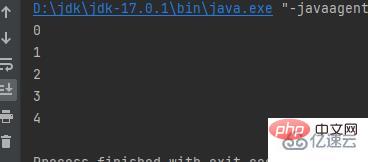 for in
for in
i corresponds to the value in the table below of array a, which is equivalent to looping output a[0],a[1]a[2],a [3]The value of a[4]public class a { public static void main(String[] args) { int[] a = {1, 2, 3, 4, 5}; for (int i : a) { System.out.println(i); } }}Copy after login
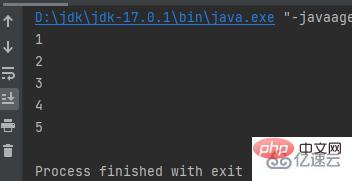 while do while
while do while
while(condition){ }
Result:- Execute the statement if the condition is met, exit if not.
public class a { public static void main(String[] args) { int i = 0; while (i < 5) { i++; System.out.println(i); } }}Copy after login
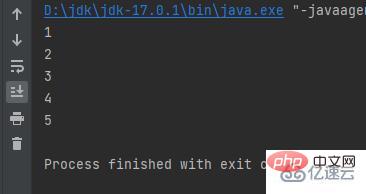
Different from while, do while is executed once Then judgeThe output is executed first and then judged. Therefore, the condition i<0 can also output once
public class a { public static void main(String[] args) { int i = 0; do { i++; System.out.println(i); } while (i < 0); }}Copy after login
The result is:
 break continue
break continue
break;Skip this time when i is divisible by 2 , proceed to the next cycle. When i is greater than 10, the loop ends.Terminate the current loop statement continue;
End this loop and immediately prepare to start the next loopint i = 0;while (++i < 20) { if (i % 2 == 0) continue; System.out.println(i); if (i > 10) break;}Copy after login
The above is the detailed content of JAVA process control is implemented in this way. For more information, please follow other related articles on the PHP Chinese website!

Hot AI Tools

Undresser.AI Undress
AI-powered app for creating realistic nude photos

AI Clothes Remover
Online AI tool for removing clothes from photos.

Undress AI Tool
Undress images for free

Clothoff.io
AI clothes remover

Video Face Swap
Swap faces in any video effortlessly with our completely free AI face swap tool!

Hot Article

Hot Tools

Notepad++7.3.1
Easy-to-use and free code editor

SublimeText3 Chinese version
Chinese version, very easy to use

Zend Studio 13.0.1
Powerful PHP integrated development environment

Dreamweaver CS6
Visual web development tools

SublimeText3 Mac version
God-level code editing software (SublimeText3)

Hot Topics
 1387
1387
 52
52
 Perfect Number in Java
Aug 30, 2024 pm 04:28 PM
Perfect Number in Java
Aug 30, 2024 pm 04:28 PM
Guide to Perfect Number in Java. Here we discuss the Definition, How to check Perfect number in Java?, examples with code implementation.
 Weka in Java
Aug 30, 2024 pm 04:28 PM
Weka in Java
Aug 30, 2024 pm 04:28 PM
Guide to Weka in Java. Here we discuss the Introduction, how to use weka java, the type of platform, and advantages with examples.
 Smith Number in Java
Aug 30, 2024 pm 04:28 PM
Smith Number in Java
Aug 30, 2024 pm 04:28 PM
Guide to Smith Number in Java. Here we discuss the Definition, How to check smith number in Java? example with code implementation.
 Java Spring Interview Questions
Aug 30, 2024 pm 04:29 PM
Java Spring Interview Questions
Aug 30, 2024 pm 04:29 PM
In this article, we have kept the most asked Java Spring Interview Questions with their detailed answers. So that you can crack the interview.
 Break or return from Java 8 stream forEach?
Feb 07, 2025 pm 12:09 PM
Break or return from Java 8 stream forEach?
Feb 07, 2025 pm 12:09 PM
Java 8 introduces the Stream API, providing a powerful and expressive way to process data collections. However, a common question when using Stream is: How to break or return from a forEach operation? Traditional loops allow for early interruption or return, but Stream's forEach method does not directly support this method. This article will explain the reasons and explore alternative methods for implementing premature termination in Stream processing systems. Further reading: Java Stream API improvements Understand Stream forEach The forEach method is a terminal operation that performs one operation on each element in the Stream. Its design intention is
 TimeStamp to Date in Java
Aug 30, 2024 pm 04:28 PM
TimeStamp to Date in Java
Aug 30, 2024 pm 04:28 PM
Guide to TimeStamp to Date in Java. Here we also discuss the introduction and how to convert timestamp to date in java along with examples.
 Java Program to Find the Volume of Capsule
Feb 07, 2025 am 11:37 AM
Java Program to Find the Volume of Capsule
Feb 07, 2025 am 11:37 AM
Capsules are three-dimensional geometric figures, composed of a cylinder and a hemisphere at both ends. The volume of the capsule can be calculated by adding the volume of the cylinder and the volume of the hemisphere at both ends. This tutorial will discuss how to calculate the volume of a given capsule in Java using different methods. Capsule volume formula The formula for capsule volume is as follows: Capsule volume = Cylindrical volume Volume Two hemisphere volume in, r: The radius of the hemisphere. h: The height of the cylinder (excluding the hemisphere). Example 1 enter Radius = 5 units Height = 10 units Output Volume = 1570.8 cubic units explain Calculate volume using formula: Volume = π × r2 × h (4
 Create the Future: Java Programming for Absolute Beginners
Oct 13, 2024 pm 01:32 PM
Create the Future: Java Programming for Absolute Beginners
Oct 13, 2024 pm 01:32 PM
Java is a popular programming language that can be learned by both beginners and experienced developers. This tutorial starts with basic concepts and progresses through advanced topics. After installing the Java Development Kit, you can practice programming by creating a simple "Hello, World!" program. After you understand the code, use the command prompt to compile and run the program, and "Hello, World!" will be output on the console. Learning Java starts your programming journey, and as your mastery deepens, you can create more complex applications.




